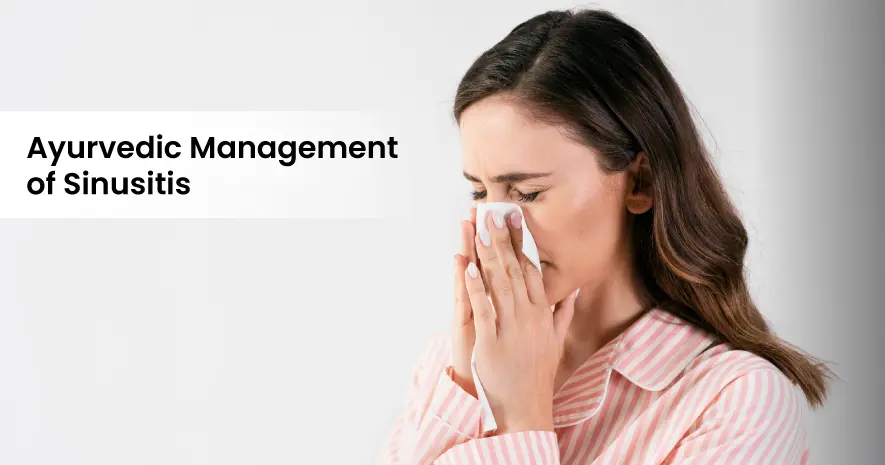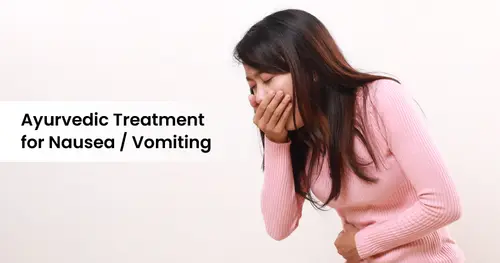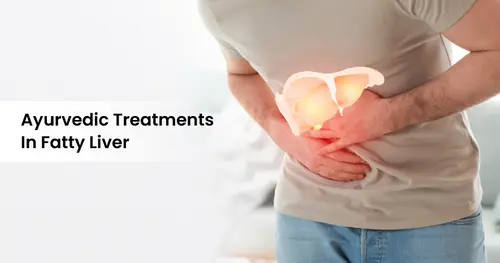
Sinusitis is a common inflammatory condition affecting the paranasal sinuses—air-filled cavities that play a crucial role in filtering and humidifying inhaled air while also facilitating mucus drainage. When the delicate balance of this drainage system is disrupted due to infection, environmental irritants, or anatomical abnormalities, mucus stagnation occurs, leading to inflammation and potential microbial colonization. Clinically, sinusitis presents as nasal congestion, facial pain, headache, thick nasal discharge, and pressure around the affected sinuses. If left untreated, it can progress to complications such as orbital cellulitis, meningitis, or even brain abscesses, underscoring the necessity of timely and effective intervention.
Ayurveda offers a profound and comprehensive understanding of sinusitis, correlating it with Suryavarta, a condition described in classical texts as a Kapha-Vata disorder affecting the nasal and cranial regions. This condition is marked by a distinct diurnal headache pattern, peaking at midday, coinciding with the sun’s highest point in the sky—hence the name Suryavarta (Surya = sun, Avarta = movement). The Ayurvedic interpretation attributes this disorder to an aggravation of Kapha dosha, leading to mucus accumulation, obstructed nasal passages, and inflammation in the upper respiratory tract. When this Kapha-induced congestion impairs Vata’s natural movement, stagnation and pressure manifest, resulting in the classical symptoms of sinusitis. The involvement of Pitta dosha exacerbates the inflammatory process, leading to localized heat, redness, and discomfort.
Through the lens of Ayurveda, sinusitis is not merely an isolated infection but a reflection of systemic doshic imbalances precipitated by dietary, lifestyle, and environmental factors. This understanding allows for a root-cause-oriented treatment approach, integrating internal detoxification, nasal therapies, dietary modifications, and supportive interventions aimed at restoring the body's innate equilibrium.
Etiology and Pathophysiology: Modern and Ayurvedic Correlations
Sinusitis arises due to a variety of factors, both infectious and non-infectious. Viral upper respiratory infections, particularly those caused by rhinoviruses, frequently trigger acute sinus inflammation, which may subsequently develop into bacterial sinusitis when Streptococcus pneumoniae or Haemophilus influenzae colonize the stagnant mucus. In immunocompromised individuals, fungal infections may also be responsible. Allergens such as pollen, dust mites, or animal dander play a significant role in chronic sinusitis, as do environmental pollutants, smoke, and chemical irritants. Structural abnormalities such as a deviated nasal septum, nasal polyps, or enlarged turbinates can further predispose individuals to recurrent episodes by impeding normal sinus drainage.
Ayurvedic pathophysiology aligns remarkably with this modern understanding. The accumulation of Kapha dosha within the sinus cavities (srotas) mirrors the mucus stagnation and obstruction observed in conventional medicine. Additionally, Kapha’s cold, heavy, and damp qualities create an ideal environment for microbial proliferation, akin to the conditions fostering bacterial overgrowth in sinus infections. The involvement of Vata dosha, which governs movement and circulation, explains the stagnation and impaired drainage leading to sinus congestion. When Pitta dosha becomes aggravated, it manifests as inflammatory symptoms—redness, heat, and localized irritation—similar to the effects of pro-inflammatory cytokines in sinus infections.
Symptoms and Clinical Manifestations
The presentation of sinusitis varies based on the severity, duration, and underlying cause. In acute cases, symptoms include nasal congestion, purulent (thick and discolored) nasal discharge, facial tenderness, headache, and fever. The pain often worsens with bending forward or lying down, reflecting increased sinus pressure. In chronic sinusitis, symptoms persist beyond 12 weeks, characterized by postnasal drip, persistent nasal obstruction, diminished sense of smell, and fatigue.
Ayurvedic texts describe Suryavarta as a condition where headache intensity fluctuates with the sun’s movement, often beginning in the morning, intensifying towards noon, and gradually subsiding thereafter. Additional symptoms such as excessive mucus production, heaviness in the head, sneezing, and pressure around the eyes closely resemble the classical manifestations of Kapha-related sinus congestion.
Ayurvedic Treatment Strategies: A Holistic Approach to Sinusitis

Ayurvedic management of sinusitis involves Nasya therapy, internal detoxification, dietary regulation, herbal interventions, and supportive treatments aimed at restoring doshic balance, alleviating inflammation, and enhancing sinus drainage.
Nasya Therapy: The Ayurvedic Nasal Detoxification
Nasya, the administration of medicated substances through the nasal passages, is the primary therapy for sinusitis. This treatment clears Kapha accumulation, reduces inflammation, and enhances nasal and sinus function. Avapeeda Nasya, which involves instilling herbal extracts or oils into the nostrils, promotes the expulsion of mucus, toxins, and microbial pathogens, paralleling modern saline irrigation techniques used in sinus care.
Kayavirechana: Systemic Detoxification
Since Kapha accumulation in the sinuses often results from broader imbalances, internal detoxification is necessary. Kayavirechana, or therapeutic purgation, helps eliminate excess Kapha and Pitta doshas from the body, supporting immune modulation and inflammation control. This systemic purification mirrors the detoxification benefits of nutritional interventions and gut microbiome regulation seen in modern medicine.
Dietary Modifications for Long-Term Sinus Health
Ayurvedic dietary principles emphasize Kapha-reducing foods that prevent excessive mucus formation. Warm, light, and easily digestible meals help maintain sinus clarity. The use of ghee-infused herbal milk is particularly beneficial, as ghee acts as a natural lubricant, reducing dryness and irritation in the nasal passages. The inclusion of pungent, bitter, and astringent tastes helps to counteract Kapha accumulation, aligning with modern dietary recommendations that advocate for anti-inflammatory, low-mucus-producing foods.
Steam Inhalation and Herbal Vapors
Medicated steam inhalation using Dasamoola Kwatha (a blend of ten roots) is an effective mucolytic and expectorant therapy, liquefying mucus and facilitating sinus drainage. The therapeutic use of warm herbal vapors parallels modern steam inhalation therapy, which has been shown to enhance mucociliary clearance and reduce congestion.
Herbal Interventions and External Applications
Lepa, or topical herbal applications, leverage the anti-inflammatory properties of ingredients like turmeric, neem, and sandalwood to reduce facial tenderness and sinus pressure. Modern research confirms that curcumin in turmeric exhibits potent anti-inflammatory and antimicrobial properties, making it a valuable adjunct in sinus care. Similarly, medicated oils infused with eucalyptus, camphor, and ginger provide warming effects that decongest the sinuses, much like modern essential oil therapy.
The Scientific and Holistic Integration of Ayurvedic and Modern Approaches
The Ayurvedic management of sinusitis aligns closely with modern medical strategies, emphasizing mucosal hydration, anti-inflammatory interventions, immune support, and detoxification. Nasya therapy enhances nasal clearance, much like saline irrigation, while herbal formulations exhibit antimicrobial and immunomodulatory effects comparable to conventional pharmacotherapy. Detoxification through Kayavirechana and dietary regulation mirrors emerging insights into gut health’s role in immune and respiratory function. By integrating these complementary approaches, Ayurveda offers a personalized, sustainable, and holistic strategy for managing both acute and chronic sinusitis.
Conclusion
Sinusitis, while common, has far-reaching implications on respiratory health and overall well-being. A purely symptomatic approach provides temporary relief, but the Ayurvedic perspective transcends symptomatic suppression, addressing root causes, systemic imbalances, and immune function. By harmonizing Kapha, regulating Vata, and pacifying Pitta, Ayurveda offers a deeply therapeutic and preventive approach, ensuring long-term relief and resilience against recurrent infections. Integrating these time-tested principles with modern scientific insights creates a balanced, effective, and sustainable path to sinus health, restoring clarity, breath, and vitality to the individual.
FAQ
1. What is sinusitis?
Sinusitis is an inflammation of the paranasal sinuses, typically caused by infection, allergies, or anatomical blockages. It leads to symptoms like nasal congestion, facial pressure, headache, and thick nasal discharge.
2. How does Ayurveda understand sinusitis?
In Ayurveda, sinusitis is often correlated with a condition called Suryavarta, a Kapha-Vata disorder. It’s believed to result from the accumulation of Kapha dosha in the head and sinuses, leading to obstruction, inflammation, and pain, especially around midday when the sun peaks.
3. What are the key symptoms of sinusitis?
- Nasal congestion and thick discharge
- Facial pain or pressure
- Headache (worsening when bending forward)
- Postnasal drip
- Loss of smell or taste
- Fatigue and general discomfort
4. What is Nasya therapy and how does it help?
Nasya is the administration of medicated oils or herbal extracts through the nose. It helps:
-Clear accumulated Kapha (mucus)
-Improve sinus drainage
-Reduce inflammation
-Enhance breathing and mental clarity
5. What is Kayavirechana and why is it recommended?
Kayavirechana refers to internal detoxification or therapeutic purgation. It is used to remove excess Kapha and Pitta from the system, supporting immune balance and reducing systemic inflammation.
6. Can Ayurveda prevent recurrent sinus infections?
Yes. Ayurvedic treatment focuses on balancing doshas and removing root causes. With consistent therapy, lifestyle regulation, and proper diet, Ayurveda can significantly reduce the recurrence of sinusitis and enhance overall immunity.

November 26, 2025

November 13, 2025

November 09, 2025

October 27, 2025

October 24, 2025

October 18, 2025
We use cookies that are necessary for the smooth operation of the website, to improve our website and to display advertising relevant to you on social media platforms and partner websites. By clicking "Accept all", you agree to the use of cookies for convenience features and statistics and tracking. You can change these settings again at any time. If you do not agree, we will limit ourselves to technically necessary cookies. For more information, please see our privacy policy .